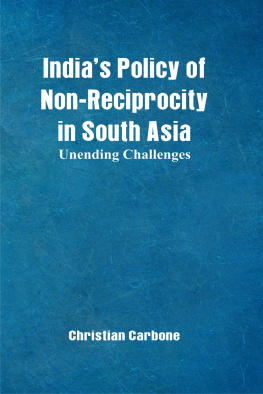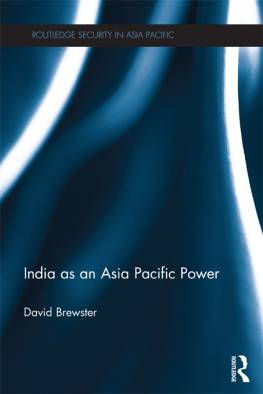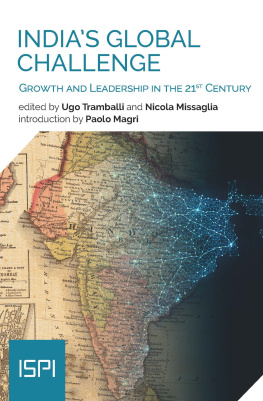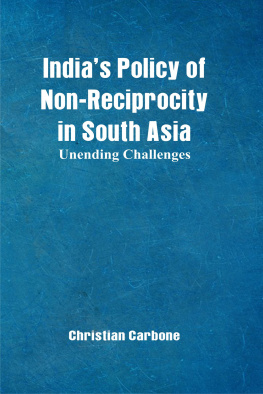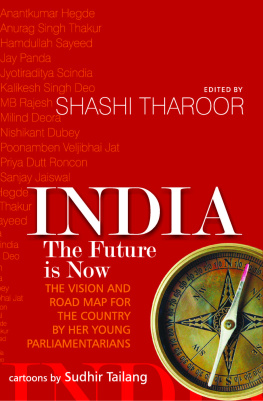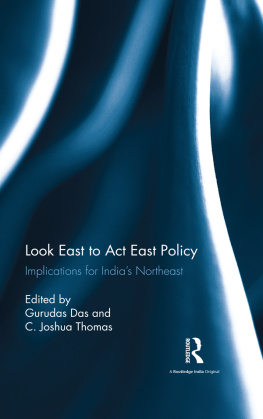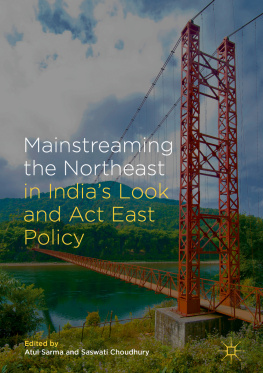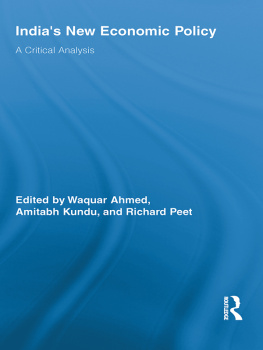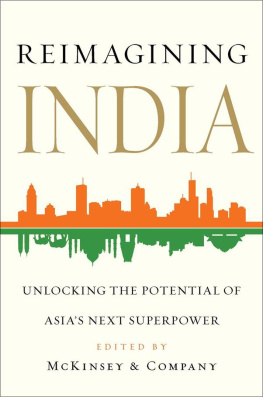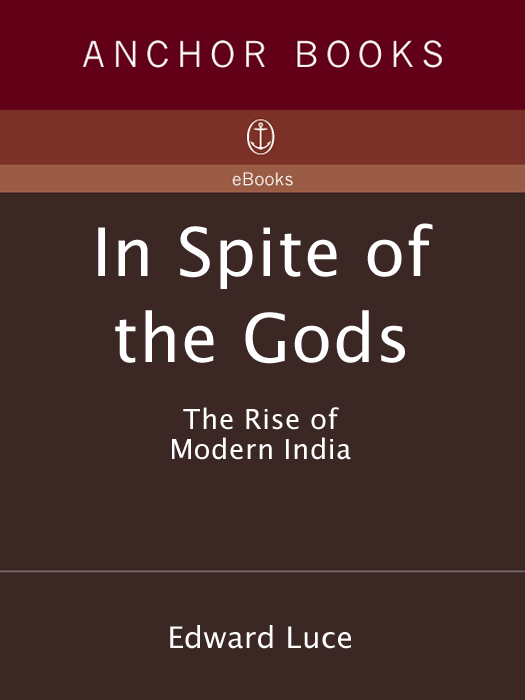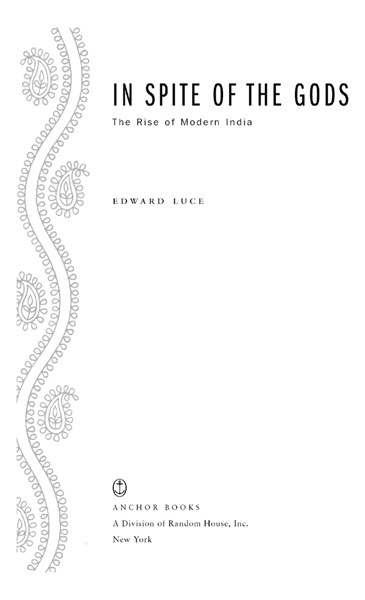Praise for Edward Luces IN SPITE OF THE GODS
[A] subtle interweaving of reportage and commentary. Luce is the best sort of foreign correspondent.
The New York Times Book Review
A perceptive, witty, and readable book that will for some time be the definitive generalists account of the countrys recent political, economic, and social development, and of its future prospects.
The Economist
Accessible and insightful. Luce looks at Indian society broadly, weaving reporting and reportage.
The Boston Globe
Luce provides a balanced, deeply personal chronicle of the frenetic and often contradictory political, religious, and economic dynamics that drive [India].
BusinessWeek
Knowledgable, witty, and sympathetic. [Luce] deftly weaves together keen observations, telling anecdotes, and scrupulous reportage. [His] India is fascinating.
Newsweek
In Spite of the Gods is not only fun to read, it is also a deeply insightful account of contemporary India. Based on the authors rare combination of intimacy and detachment, the book can serve, remarkably enough, both as a fine introduction for unacquainted outsiders and as a mature scrutiny that is bound to stimulate insiders.
Amartya Sen, winner of the Nobel Prize in Economics
[A] brilliantly observant book.
The Times (London)
A wonderfully engaging portrait of India, written with that mixture of affection and exasperation people feel for something they love in spite of everything they know about it.
The Sunday Telegraph (London)
In Spite of the Gods is some way ahead of the game. Luce is a highly perceptive and intelligent writer and, unusually, he understands how India works.
The Sunday Times (London)
In Spite of the Gods is without question the best book yet written on New India: witty, clear, and accessible yet minutely researched and confidently authoritative. Edward Luce has proved himself an affectionate and unusually perceptive observer of the Indian scene.
William Dalrymple, author of White Mughals
Thoughtful and thorough. Luce is better placed than most to write this book [and] his combination of closeness and distance lends him objectivity and credibility.
The Observer (London)

EDWARD LUCE
IN SPITE OF THE GODS
Edward Luce is the Washington bureau chief for the Financial Times. He was the papers South Asia bureau chief, based in New Delhi, between 2001 and 2006. From 1999 to 2000, Luce worked in the Clinton administration as the speechwriter for Treasury Secretary Larry Summers. Educated at Oxford and married into an Indian family, Luce now lives in Washington, D.C.
FIRST ANCHOR BOOKS EDITION, MARCH 2008
Copyright 2007 by Edward Luce
All rights reserved. Published in the United States by Anchor Books, a division of Random House, Inc., New York. Originally published in Great Britain by Little, Brown Book Group, a member of the Hachette Livre Group of Companies, London, and subsequently in hardcover in the United States by Doubleday, an imprint of The Doubleday Broadway Publishing Group, a division of Random House, Inc., New York, in 2007.
Anchor Books and colophon are registered trademarks of Random House, Inc.
The Library of Congress has cataloged the Doubleday edition as follows:
Luce, Edward, 1968
In spite of the gods : the strange rise of modern India / by Edward Luce.1st ed.
p. cm
1. IndiaEconomic conditions21st century.
2. IndiaCivilization. I. Title.
HC435.3.L83 2007
954.053dc22
2006014227
Author photograph Martin Simon
eISBN: 978-0-307-38953-4
www.anchorbooks.com
v3.1
contents
preface
This book is not about a love affair with the culture and antiquities of India. I have read too many paeans to India by foreigners to have any thoughts of adding to that extensive list. It is about the changing political economy and society of a country whose future will increasingly affect the rest of the world. When reporting on India for the Financial Times I usually adhered to the detached and impersonal style that journalists follow. But a book is different, and much of what follows is in the first person. Some of what is contained in these pages is of a critical nature, occasionally very critical. It is hard to observe and chronicle the workings of Indias political, economic, and legal systems without sometimes feeling outrage at the squandering of life opportunities for the hundreds of millions of Indians who still live in poverty. Their opportunities are improving, albeit not rapidly enoughbut improving nevertheless. It is hard, too, not to feel frustration with the large numbers of foreigners and Indians who are still wont to see India through a purely spiritual lens. A lot is written about American and French exceptionalism (neither of which sanctifies poverty, it should be added). A lot more could still be written on the Indian variety.
Yet without my deep affection forand fascination byIndia I would never have written this book. Over the years and in the most unexpected ways India has taught me as much about humanity in general as it has about itself. Although occasionally mystifying, India has always opened its doors to me and other inquiring outsiders. With amazingly few exceptions, Indians have been unreservedly kind, open, hospitable, and tolerant of the interrogations of an intrusive foreigner. Quite without meaning to do so, India has also taught me how inhospitable we in the Westand especially in Britaincan often be. I hope the reader will recognize that there is no contradiction between criticism and affection. That way the reader will more easily chime with the books anticipation of Indias rise to a much more significant global role in the first few decades of the twenty-first century.
In five years of traveling around India, observing events and interviewing peoplefour years as bureau chief for the Financial Times and one working on this bookI can think of only a handful of occasions when I was denied access to somebody or to some information that I was seeking. Since I have interviewed many hundreds of Indians, some of them on many occasions, it would take a chapter simply to list them. So I will confine mention to a few people who have been consistently helpful, many of whom have become firm friends. With a few exceptions, I have omitted the names of politicians and businessmen, since availability to journalists is a normal part of their professional lives. I would like to express my profound thanks to Shankar Acharya, Swami Agnivesh, Montek and Isher Ahluwalia, Mani Shankar Aiyar, M. J. Akbar, Sohail Akbar (and his delightful parents in Allahabad), Anil Ambani, Kanti Bajpai, Sanjaya Baru, Rahul Bedi, Jagdish Bhagwati, Surjit Bhalla, Uday Bhaskar, Kiran Bhatty and Aslam Khan (Karen and Islam), Farhan Bokhari, Michael and Jenny Carter, Ram Chandra (Golu), Vikram Chandra, Vijay Chautiawale, Ashok Chowgule, Stephen P. Cohen, Tarun Das, Nikhil Dey, Jean Dreze, Gordon Duguid, Verghese George, Sagarika Ghosh, Omkar Goswami, Dipankar and Mala Gupta, Shekhar Gupta, Swapan Das Gupta, Husain Haqqani, David Housego, Tony Jesudasan, Prem Shankar Jha, Vijay Kelkar, Sunil Khilnani, Sudheendra Kulkarni, Hanif Lakdawala, Kamal M, Ram Madhav, Moni Malhoutra, Harsh Mander, Ashok Mehta, Pratap Bhanu Mehta, Vinod Mehta, Murli Menon, Khozem Merchant and Malavika Sanghvi, Anjali Mody, Jayaprakash Narain, Sunita Narain, Kishan Negi, Nandan Nilekani, T. N. Ninan, Udit Raj, N. and Mariam Ram, Mahesh Rangarajan, Aruna Roy, Raman Roy, Rajdeep Sardesai, Navtej Sarna, Tesi Schaffer, Suhel Seth, Jyotirmaya Sharma, Ajai and Sonia Shukla, Arun Singh, Mala and Tejbir Singh, N. K. Singh, Ashley Tellis, Karan Thapar, Ashutosh Varshney, and George Verghese.


